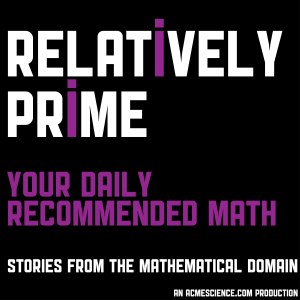Maths – as teachers are fond of telling anyone who’ll listen – is everywhere. In this difficult second episode of the difficult second series of Relatively Prime, Samuel Hansen shows us a few important places where it can be a help: at the petrol pump, at the birthday party, in the car park and at the bar — or rather, in deciding whether to go.
He starts with Aperiodipal Matt Parker, who is uncharacteristically short on ideas when it comes to using maths in real life — but we’re treated to a couple of ideas (palindromic numbers at the petrol pump and rounding tips to the nearest square number) whereby patterns can help identify particular transactions (in the first instance) and tip fraud (in the second).
This, though, is just setting us up for the main event, Samuel’s birthday, which (rather confusingly) changes from 12 days away to two days away to in the past, all within the space of 10 minutes. He speaks with Alex Bellos about Francis Galton’s favourite way of cutting a cake without allowing it to go stale, and with game theorist Steven Brams about the fair division problem: if he likes icing and I like filling, how do we split the cake so neither of us feels hard done by?
It’s all very well going to Samuel’s lair for cake, but it’s well-known that parking around there is an absolute nightmare. How do you know whether to take a parking space you can see or continue looking for a better one? Laura Mclay of Punk Rock Operations Research has the answer (or a series of possible answers, depending on what you mean by ‘better’.)
Lastly, W. Brian Arthur explains one of game theory’s classical puzzles, the El Farol bar problem, which relates to a bar that’s no fun if it’s too crowded. How do you decide whether to go? It turns out there’s no good, rational way to decide without falling into a paradox; instead, you have to use inductive reasoning and come up with a best guess. In simulations, it turns out that roughly the optimal number of people show up, on average.
As I said at the start, it’s a difficult episode: in several places, Samuel’s desire to explain and entertain obstructs rather than enhances the interviews (particularly the paradox section and when waxing lyrical about cakes) — the comedy fell a little flat for me. Relatively Prime is at its best when Samuel is teasing answers out of his interviewees rather than talking to camera. So to speak.
Overall verdict: I liked the content, but could do with a bit less clowning around. Looking forward to Episode 3, which appears to be entitled “Mathematistan”.
More information
Listen to Relatively Prime: Your Daily Recommended Math[s] at relprime.com. While you’re there, catch up on Season 1.
Colin was given early access to Season 2 of Relatively Prime, in return for writing reviews of each episode. Furthermore, Samuel is Aperiodipal numero uno and most of us chipped some money into the Relatively Prime Kickstarter, too. Just so you know.
